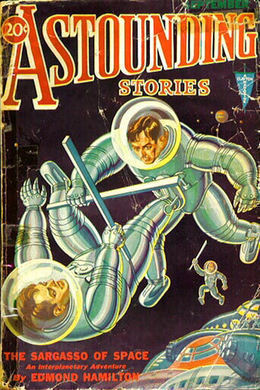
-
EPUB 157 KB
-
Kindle 181 KB
-
Support epubBooks by making a small $2.99 PayPal donation purchase.
This work is available in the U.S. and for countries where copyright is Life+70 or less.
Description
Helpless, doomed, into the graveyard of space floats the wrecked freighter Pallas. – ‘The airlock’s inner door then slid open and the newcomers stepped into the ship’s interior, unscrewing their transparent helmets as they did so.’
35 pages with a reading time of ~45 minutes (8829 words), and first published in 1931. This DRM-Free edition published by epubBooks, 2014.
Community Reviews
There are currently no other reviews for this book.
Excerpt
Captain Crain faced his crew calmly. “We may as well face the facts, men,” he said. “The ship’s fuel-tanks are empty and we are drifting through space toward the dead-area.”
The twenty-odd officers and men gathered on the middle-deck of the freighter Pallas made no answer, and Crain continued:
“We left Jupiter with full tanks, more than enough fuel to take us to Neptune. But the leaks in the starboard tanks lost us half our supply, and we had used the other half before discovering that. Since the ship’s rocket-tubes cannot operate without fuel, we are simply drifting. We would drift on to Neptune if the attraction of Uranus were not pulling us to the right. That attraction alters our course so that in three ship-days we shall drift into the dead-area.”
Rance Kent, first-officer of the Pallas, asked a question: “Couldn’t we, raise Neptune with the radio, sir, and have them send out a fuel-ship in time to reach us?”
“It’s impossible, Mr. Kent,” Crain answered. “Our main radio is dead without fuel to run its dynamotors, and our auxiliary set hasn’t the power to reach Neptune.”
“Why not abandon ship in the space-suits,” asked Liggett, the second-officer, “and trust to the chance of some ship picking us up?”
The captain shook his head. “It would be quite useless, for we’d simply drift on through space with the ship into the dead-area.”
The score of members of the crew, bronzed space-sailors out of every port in the solar system, had listened mutely. Now, one of them, a tall tube-man, stepped forward a little.
“Just what is this dead-area, sir?” he asked. “I’ve heard of it, but as this is my first outer-planet voyage, I know nothing about it.”
“I’ll admit I know little more,” said Liggett, “save that a good many disabled ships have drifted into it and have never come out.”
* * * * *
“The dead area,” Crain told them, “is a region of space ninety thousand miles across within Neptune’s orbit, in which the ordinary gravitational attractions of the solar system are dead. This is because in that region the pulls of the sun and the outer planets exactly balance each other. Because of that, anything in the dead-area, will stay in there until time ends, unless it has power of its own. Many wrecked space-ships have drifted into it at one time or another, none ever emerging; and it’s believed that there is a great mass of wrecks somewhere in the area, drawn and held together by mutual attraction.”
“And we’re drifting in to join them,” Kent said. “Some prospect!”
“Then there’s really no chance for us?” asked Liggett keenly.
Captain Crain thought. “As I see it, very little,” he admitted. “If our auxiliary radio can reach some nearby ship before the Pallas enters the dead-area, we’ll have a chance. But it seems a remote one.”
He addressed himself to the men: “I have laid the situation frankly before you because I consider you entitled to the truth. You must remember, however, that while there is life there is hope.
“There will be no change in ship routine, and the customary watches will be kept. Half-rations of food and water will be the rule from now on, though. That is all.”
As the men moved silently off, the captain looked after them with something of pride.
“They’re taking it like men,” he told Kent and Liggett. “It’s a pity there’s no way out for them and us.”
“If the Pallas does enter the dead-area and join the wreck-pack,” Liggett said, “how long will we be able to live?”
“Probably for some months on our present condensed air and food supplies,” Crain answered. “I would prefer, myself, a quicker end.”
“So would I,” said Kent. “Well, there’s nothing left but to pray for some kind of ship to cross our path in the next day or two.”
